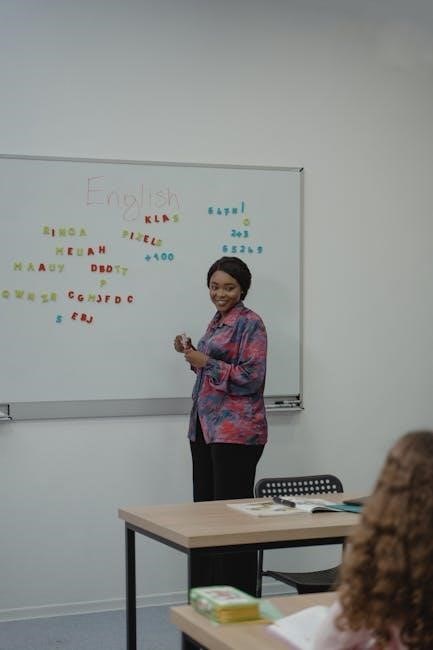Instructing the ignorant requires empathy, patience, and a clear understanding of their knowledge gaps․ Education bridges ignorance, fostering awareness and critical thinking․ Empowering others through knowledge enriches society․
1․1 Understanding the Concept of Ignorance
Ignorance refers to a lack of knowledge, information, or understanding about a particular topic or subject․ It is a natural state that arises from limited exposure, education, or cultural barriers․ Ignorance can manifest in various forms, such as misinformation, unawareness of facts, or a misunderstanding of concepts․ Recognizing ignorance is the first step toward addressing it, as it allows individuals to seek knowledge and clarification․ Overcoming ignorance requires empathy, education, and a willingness to learn, ensuring that individuals can grow intellectually and socially․

1․2 The Importance of Education in Addressing Ignorance
Education is a powerful tool for combating ignorance, as it provides individuals with the knowledge and skills needed to understand the world․ Through structured learning, education dismantles misinformation and fosters critical thinking․ It equips people with the ability to question assumptions and seek truth, thereby reducing the prevalence of ignorance․ By promoting literacy, numeracy, and cultural awareness, education empowers individuals to make informed decisions, contributing to personal and societal progress․ Thus, education serves as the cornerstone in the fight against ignorance, enabling individuals to navigate complex realities effectively․
The Psychology of Ignorance
Ignorance stems from cognitive biases and limited knowledge, often reinforced by overconfidence․ Psychological factors like the Dunning-Kruger effect highlight how unaware individuals may overestimate their understanding, hindering growth․
2․1 Cognitive Biases and Their Role in Perpetuating Ignorance
Cognitive biases, such as confirmation bias and the Dunning-Kruger effect, significantly contribute to ignorance․ These biases distort perception, leading individuals to overlook evidence and cling to misconceptions․ Confirmation bias, for instance, makes people favor information that aligns with their beliefs, while the Dunning-Kruger effect causes overconfidence in inaccurate knowledge․ These mental shortcuts prevent the acceptance of new information, reinforcing ignorance․ Addressing these biases requires awareness and critical thinking, enabling individuals to question their assumptions and seek truth․
2․2 The Dunning-Kruger Effect: When Ignorance Meets Confidence
The Dunning-Kruger effect occurs when individuals with limited knowledge or skills overestimate their competence․ This cognitive bias creates a dangerous mix of ignorance and confidence, leading people to make poor decisions despite their lack of understanding․ It often stems from metacognitive deficits, where individuals cannot objectively assess their own abilities․ This phenomenon highlights the challenge of addressing ignorance, as those affected are unaware of their knowledge gaps․ Recognizing this effect is crucial for fostering humility and a willingness to learn, which are essential for overcoming ignorance and fostering intellectual growth․

Effective Strategies for Instructing the Ignorant
Effective instruction requires patience, empathy, and clear communication․ Using analogies and relatable examples simplifies complex concepts, fostering understanding and engagement in learners․
3․1 Patience and Empathy in the Learning Process
Patience and empathy are crucial when instructing the ignorant․ Recognizing knowledge gaps without judgment fosters a safe learning environment․ Empathy builds trust, encouraging learners to ask questions and seek clarification․ Patience allows educators to break down complex ideas into digestible parts, ensuring understanding․ By combining these qualities, educators create a supportive atmosphere where learners feel comfortable admitting ignorance and actively participate in their own education․ This approach not only enhances learning but also empowers individuals to embrace lifelong knowledge acquisition․
3․2 Using Analogies and Relatable Examples to Simplify Complex Concepts
Using analogies and relatable examples is a powerful way to simplify complex concepts for the ignorant․ By bridging knowledge gaps with familiar scenarios, educators make abstract ideas more accessible․ For instance, explaining technical processes through everyday experiences, like comparing coding to cooking, helps learners visualize and understand․ Relatable examples reduce confusion and enhance engagement, making the learning process more effective․ This approach ensures that even intricate topics are presented in a digestible manner, fostering comprehension and retention․ It’s a key strategy for making education inclusive and impactful․

3․3 Encouraging Critical Thinking and Questioning

Encouraging critical thinking and questioning is essential when instructing the ignorant․ It fosters curiosity, analysis, and informed decision-making․ By promoting a culture where questions are valued, educators help learners move beyond mere memorization to deeper understanding․ This approach breaks down barriers of ignorance by empowering individuals to seek knowledge independently․ Open-ended discussions and real-world applications further enhance the ability to think critically, ensuring that learning is both meaningful and lasting․ Cultivating a safe environment for inquiry is key to unlocking intellectual growth and awareness․

The Role of Technology in Educating the Ignorant
Technology plays a pivotal role in educating the ignorant by providing accessible resources and tools․ It bridges knowledge gaps, enabling lifelong learning and fostering awareness globally․
4․1 Search Engines and Their Impact on Access to Information
Search engines have revolutionized access to information, enabling users to retrieve targeted results quickly․ They empower individuals to address knowledge gaps, fostering education and awareness․ By mastering search query syntax, users can refine results, enhancing learning efficiency․ However, challenges like information overload and misinformation persist, requiring critical thinking․ Search engines democratize knowledge, making it accessible globally and promoting lifelong learning․ They serve as essential tools in educating the ignorant, bridging gaps and empowering individuals to seek understanding․ Their impact is profound, reshaping how we acquire and utilize information in the digital age․

4․2 The Benefits and Limitations of Online Learning Platforms
Online learning platforms offer unprecedented access to education, breaking barriers of time and location․ They provide diverse courses, catering to various learning needs and styles․ However, limitations exist, such as the need for self-discipline and potential disparities in content quality․ Despite these challenges, platforms like Coursera and Khan Academy democratize education, enabling individuals to address ignorance proactively․ They empower learners to acquire new skills and knowledge, fostering personal growth and societal progress․ Balancing convenience with critical engagement is key to maximizing their educational potential and impact․
Real-World Examples of Successful Education
Historical literacy movements and modern digital education initiatives exemplify how targeted instruction reduces ignorance․ Their success demonstrates the transformative power of education in empowering individuals globally․
5․1 Historical Movements for Literacy and Education
Historical movements, such as the global push for universal literacy in the 19th and 20th centuries, illustrate the societal impact of educating the ignorant․ These movements, often led by governments and non-profits, emphasized access to education for all, regardless of class or gender․ For example, the establishment of public schools and compulsory education laws transformed societies by reducing ignorance and fostering economic growth․ These efforts laid the foundation for modern education systems, proving that targeted instruction can eradicate widespread ignorance and empower future generations․
5․2 Modern Initiatives for Global Education and Awareness
Modern initiatives like the United Nations’ Sustainable Development Goals and global campaigns for digital literacy are transforming education․ Organizations such as UNESCO and the Global Partnership for Education focus on eradicating ignorance by providing access to quality education worldwide․ Online platforms and mobile learning apps have also emerged, offering free or low-cost educational resources․ These efforts aim to bridge knowledge gaps, promote inclusivity, and empower individuals, ensuring that no one remains in ignorance due to lack of opportunities․ Technology plays a crucial role in these contemporary educational movements․
Addressing Misinformation and Disinformation
Addressing misinformation requires media literacy, fact-checking, and critical thinking․ Educating individuals to verify sources empowers them to combat ignorance and make informed decisions effectively online․
6․1 The Role of Media Literacy in Combating Ignorance
Media literacy equips individuals with the skills to critically analyze information, identify biases, and recognize misinformation․ By understanding how media operates, people can discern credible sources, enhancing their ability to make informed decisions․ This competence fosters a more informed society, reducing the spread of ignorance and promoting a culture of discernment and critical thinking in the digital age․ Educating individuals to navigate media effectively is essential for combating misinformation and fostering an informed populace․
6․2 Fact-Checking and Verification in the Digital Age
Fact-checking and verification are crucial tools for combating misinformation and ignorance․ In the digital age, where information spreads rapidly, verifying sources ensures accuracy and credibility․ Platforms and initiatives dedicated to fact-checking help identify false claims, fostering transparency and trust․ By encouraging individuals to question and verify information, society can reduce the spread of misinformation․ This practice promotes critical thinking and empowers people to make informed decisions, countering ignorance effectively in an increasingly complex information landscape․

The Importance of Lifelong Learning
Lifelong learning fosters personal growth and adaptability, enabling individuals to stay informed and overcome ignorance․ Embracing curiosity and continuous education empowers people to thrive in an evolving world․
7․1 Continuous Education as a Tool for Personal Growth
Continuous education is a powerful tool for personal growth, enabling individuals to stay informed and adaptable in a rapidly changing world․ It fosters empathy, critical thinking, and curiosity, helping people overcome ignorance and broaden their perspectives․ By embracing lifelong learning, individuals can acquire new skills, challenge assumptions, and develop a deeper understanding of the world․ This process not only enhances intellectual abilities but also builds confidence and resilience, encouraging individuals to confront and admit gaps in their knowledge․ Ultimately, continuous education empowers people to thrive and contribute meaningfully to society․
7․2 Overcoming the Fear of Asking Questions and Admitting Ignorance
Overcoming the fear of asking questions and admitting ignorance is crucial for personal growth and learning․ Many individuals hesitate to seek clarification due to fear of judgment or embarrassment․ However, acknowledging gaps in knowledge is the first step toward understanding․ Creating a supportive environment where questions are encouraged fosters curiosity and reduces stigma․ Admitting ignorance demonstrates humility and a willingness to learn, which are essential for intellectual development․ By embracing this mindset, individuals can break free from the constraints of unawareness and actively pursue knowledge with confidence and openness․
